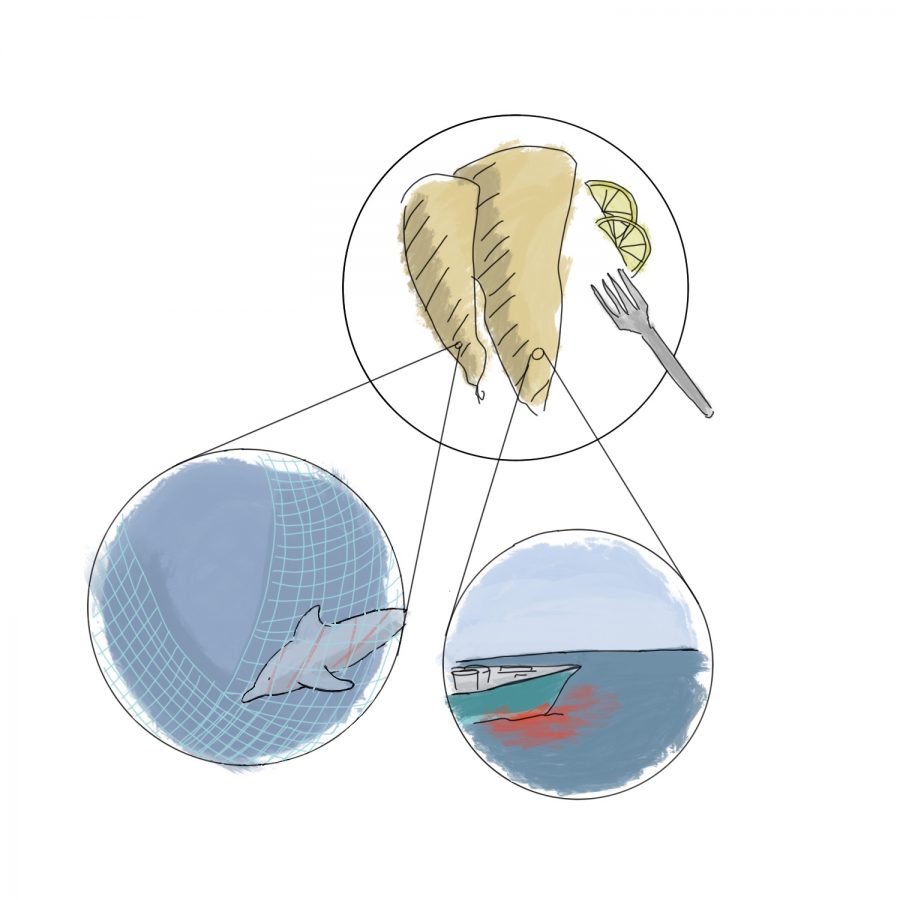“Seaspiracy” Brings Aquatic Destruction to the Surface
April 29, 2021
Rating: 5/5 Falcons
On March 24th, Netflix Originals released Seaspiracy, a documentary entailing human actions that have had devastating effects on the ocean. The series focuses on overfishing and how the media has failed to publicize this information. The documentary begins with filmmaker Ali Tabrizi sharing his backstory. The 27-year old has always had a passion for marine life and began creating a movie in his early adulthood based on the beauty of dolphins and whales, his two favorite animals. In his documentation, Ali found devastating news about whales washing up on shorelines with pounds of plastic in their stomachs. With confusion as to why there was minimal fuss going on in the news about how these animals were dying at the hands of human actions, Ali decided to shift his series towards the effects humans have on the oceans. With a focus on the death of whales, the filmmaker found that many of the species weren’t dying by ‘accidents’ due to plastic littering, but due to humans intentionally killing these creatures.
Ali traveled to Japan after discovering that the country was notorious for the constant mass slaughter of whales. According to Greenpeace, whaling was officially banned in the late 1990s, but countries including Japan and Norway continue to practice it with little consequence. Upon arrival in Japan, the filmmaker saw with his own eyes whales being brought in by large fishing vessels daily, along with dolphins being trapped and killed in the harbors. According to Seaspiracy, dolphins and whales are hunted because fishing industries in countries like Japan and Norway increase the amount of fish available for hunting by decreasing the amount eaten by dolphins and whales. While filming, Ali also stumbled upon the mass overfishing of tuna, and found that thousands of sharks were being killed solely for their fins to supply shark fin soup production. With confusion as to why these fishing ports weren’t being shut down, Ali noticed that he was being followed by police officers and security guards all around the Japanese city he was staying in. Seaspiracy stated that, “these fishing companies are mafia owned with ties to local law enforcement.” This shocking realization made it clear as to why no one wanted to stop the overfishing that took place in parts of Japan.
Ali later traveled to America, where he met with marine conservationists to dig deep into the truth behind the under-covered mass murder that was taking place. Seaspiracy brought in shark conservationist and co-host of Shark Week, Paul De Gelder, for insight into the importance the species has on our planet. De Gelder explained that sharks are the apex predators of the oceans, who take part in eating the weak animals that cause damage to coral reefs. “If these animals go, so do we,” he adds. Without sharks, the ocean is unable to remain clean and unable to remove animals that further harm the environment. De Gelder emphasizes how the media has continued to portray sharks as terrifying creatures that will kill anything, as seen in the infamous movie Jaws. As a society, we are all somewhat afraid of sharks. The marine conservationist shares that roughly ten people a year are killed by sharks; however, humans are the true killers, murdering around 30,000 sharks are killed per hour.
The filmmaker later interviews Sea Shepherd, a non-profit organization that goes out to international waters and stops large fishing vessels from harshly killing whales. Peter Hammarstedt, co-leader of the organization, shares how these large ships often only target one fish at a time, and by using massive fishing nets, other fish that are caught are killed in the process. For example, if a vessel was fishing for tuna and other species were caught in the process, all the other fish in the nets would be killed, no matter how many tuna were caught. The unwanted species, or bycatch as the fishers call them, would be killed. Seaspray shares that five million sharks, along with 30,000 dolphins and whales are killed each year as bycatch alone. Hammarstedt then discusses the validity behind large corporations labeling their seafood as “wild-caught” or “dolphin-safe.” The filmmaker tried to interview some of these corporations to gain insight into these claims. However, upon arrival, Ali was either asked to leave, or left without his questions answered. Hammarstedt states that there is no way of telling if these fish are caught legally or are considered “wild-caught” because there is no regulation in international waters. Consequently, identifying whether the fish you buy is healthy, or legally caught, is yet another piece of information that isn’t put forth in our news. Seaspiracy received a five-star falcon rating for providing the public with this information that is scarce in the media.
Seaspiracy also touches on ways humans are quickly destroying our ecosystem through the litter of fishing nets, which contributes to over 80% of the ocean plastics; overfishing, which is leaving many species in the ocean extinct; and the constant lies that are shared between corporations that are selling these products. While it is disturbing that so many of the statistics in the series are new to a majority of the viewers, it is time that our world starts focusing on ways climate change can be combated. Understanding the importance of the ocean will allow the world to be informed about the severities of climate change, and the production of Seasipracy is taking that step in the right direction.











